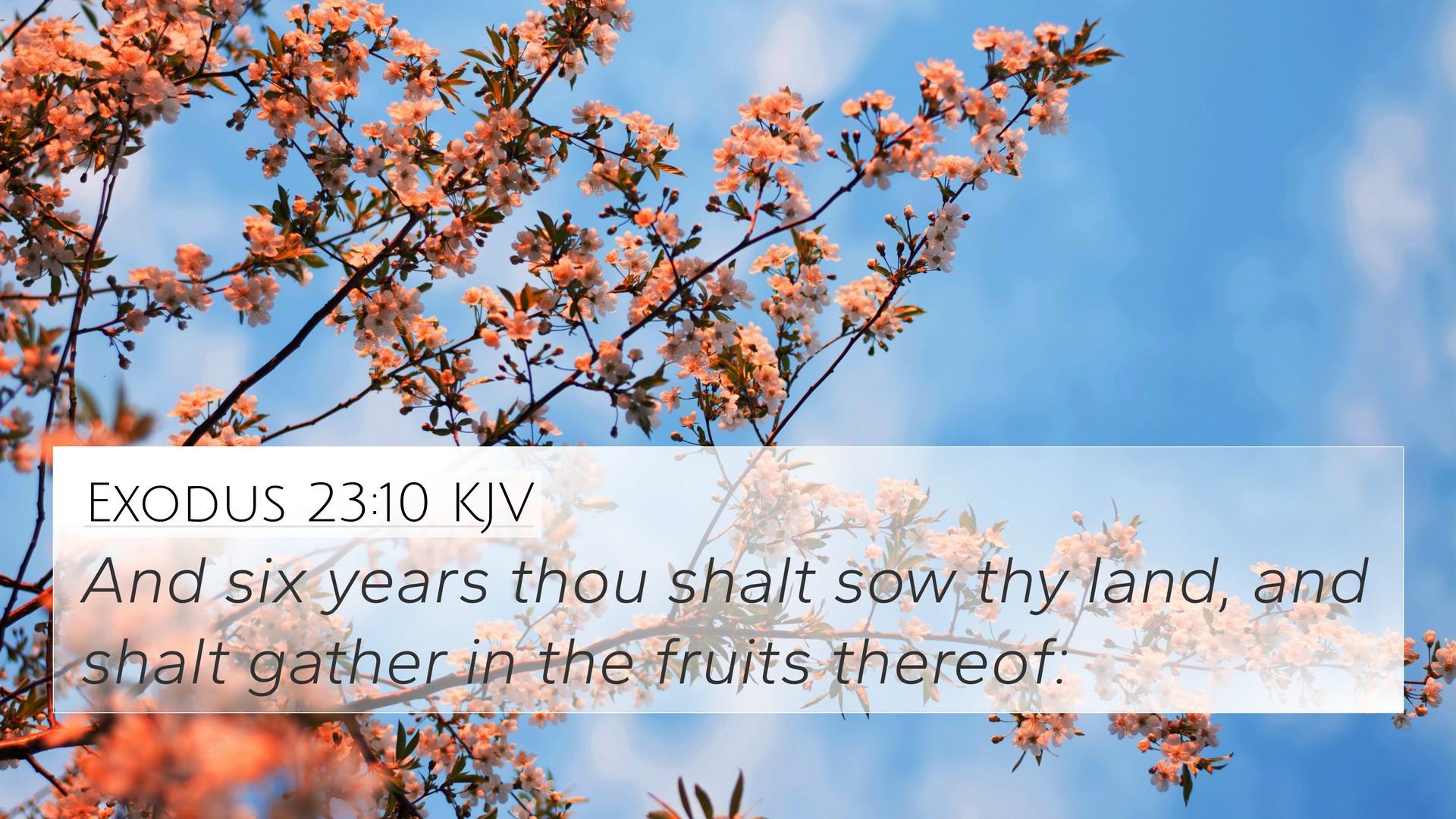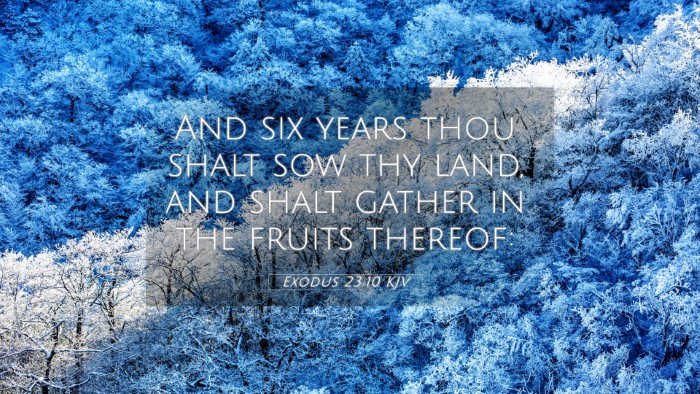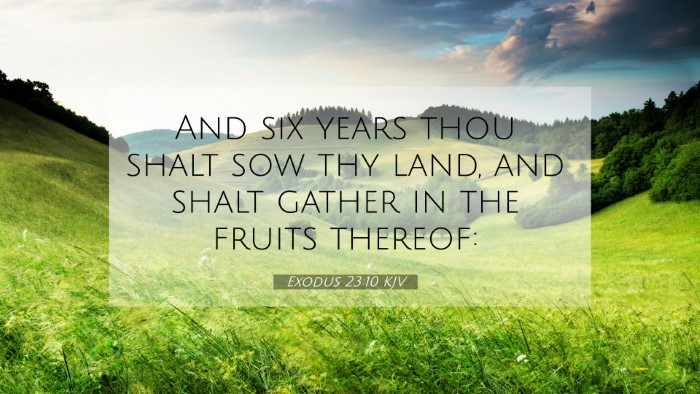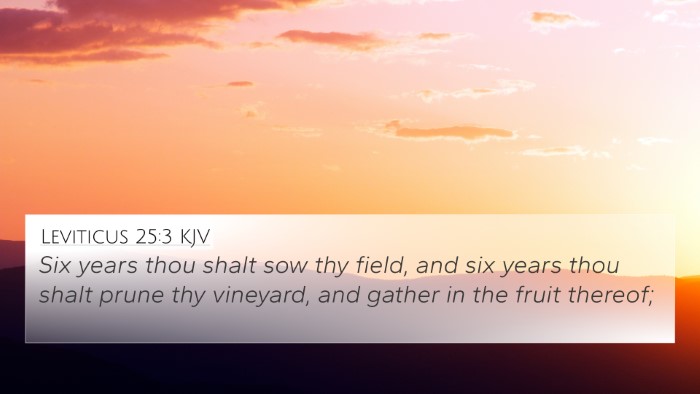Understanding Exodus 23:10
Verse: Exodus 23:10
Text: "For six years you shall sow your land and gather its produce, but the seventh year you shall let it rest and lie fallow, that the poor of your people may eat; and what they leave the beasts of the field may eat. In like manner you shall do with your vineyard and your olive grove."
Summary of Meaning
Exodus 23:10 presents God's command regarding agricultural practices, emphasizing the importance of rest and provision for both the land and those in need. The verse conveys themes of stewardship, compassion, and the cyclical nature of life.
Commentary Insights
Matthew Henry emphasizes that this command was not only an aspect of agricultural practice but also a call for the Israelites to trust in God's provision. By allowing the land to rest in the seventh year, the people demonstrated their reliance on God who provides for all their needs. The sabbatical year illustrates a foundational biblical principle that acknowledges divine ownership of creation.
Albert Barnes notes that the agricultural guidelines serve practical and social purposes, ensuring that both the poor and the land are taken care of. This provision reveals God’s desire for equity in society, allowing the less fortunate to benefit from the abundance produced by the land.
Adam Clarke points out that the concept of allowing the land to lie fallow reflects a broader theological theme seen throughout Scripture regarding rest. The sabbath principle encapsulated in this verse connects to the idea of spiritual rest and renewal that is echoed in later texts about the Sabbath observance. Clarke highlights the importance of community and mercy, as this instruction allows for shared participation in God's bounty.
Cross-References for Exodus 23:10
- Leviticus 25:3-5 - Discusses the sabbatical year and its implications for land use and social welfare.
- Deuteronomy 15:1-2 - Outlines the commandment to forgive debts every seven years, promoting mercy and economic equity.
- Matthew 6:31-33 - Jesus teaches reliance on God for provision, mirroring the trust illustrated by the sabbatical year.
- Mark 2:27 - Jesus emphasizes that the Sabbath was made for man, highlighting the importance of rest.
- Isaiah 58:6-7 - Calls for acts of compassion and mercy, connecting the care for the poor with fulfilling God’s commandments.
- Hebrews 4:9-10 - Discusses the rest that remains for God’s people, echoing the sabbath theme found in Exodus.
- Psalm 104:13-14 - Presents God as providing for His creation, which aligns with the agricultural principles in Exodus 23:10.
- 2 Corinthians 9:9 - Quotes Psalm 112 about the righteous who gives to the poor, relating to the welfare aspect in Exodus 23:10.
Thematic Connections
The order for the land to rest is representative of larger themes found throughout the Bible concerning forgiveness, mercy, and community welfare. Acknowledging that the land is a shared resource promotes unity among the Israelites and their dependence on God's provision.
Cross-referencing Biblical texts
This verse serves as a poignant link in the tapestry of Scripture, demonstrating how various themes intersect and support one another. By examining these connections through a Bible cross-reference system, readers can navigate through God's expectations for stewardship, a central tenet that continues to resonate in both the Old and New Testaments.
Tools for Bible Cross-Referencing
- Bible concordance
- Bible cross-reference guide
- Cross-reference Bible study
- Bible reference resources
- Bible chain references
Conclusion
In Exodus 23:10, we find a profound command that speaks not only to the agricultural practices of ancient Israel but also rings true to the principles of compassion, stewardship, and divine reliance. Through comparative Bible verse analysis, we recognize that the insights gleaned from this verse relate extensively to God's overarching narrative of love, justice, and provision in both the Old and New Testaments.
This thorough exploration highlights the importance of cross-referencing Bible verses to draw deeper insights and draw parallels among scriptural themes, ultimately enriching our understanding of God's word.



